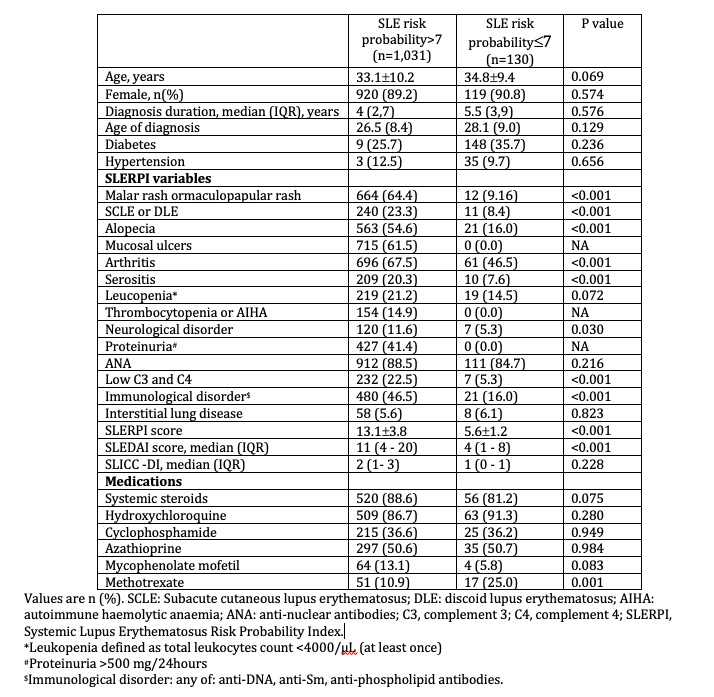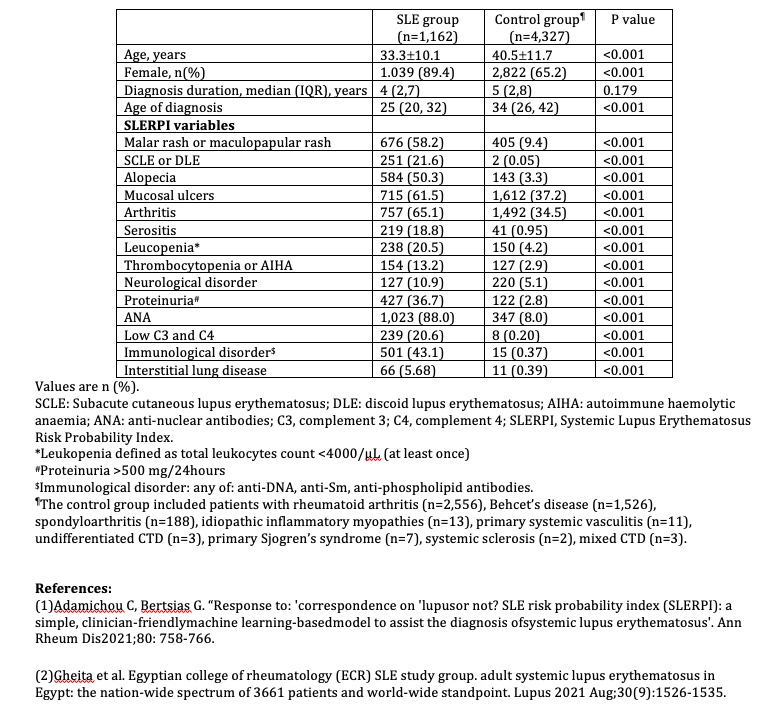Session Information
Session Type: Poster Session A
Session Time: 10:30AM-12:30PM
Background/Purpose: Systemic lupus erythematosus (SLE) is a complex autoimmune disease characterized by a great heterogeneity and unpredictable flare. In managing patients with SLE, the diagnosis has been a great challenge, and there are still no standard classification criteria to solve the problem. Adamichou et al.(1) recently developed a new machine learning-based index, the SLE Risk Probability Index (SLERPI), to help diagnose of SLE. The SLERPI includes 14 variably weighted clinical and serological features. This model has been estimated and validated in limited populations. It is currently unknown how this index performs in patients with SLE in different races. Thus, this study aimed to evaluate the performance of SLERPI in patients with SLE using a population-based, multicenter, cross-sectional Egyptian College of Rheumatology (ECR) cohort(2).
Methods: The Egyptian cohort comprised 1,162 patients with SLE and 4,327 without SLE (other rheumatic diseases serve as a control group¶) who were recruited from the Rheumatology Departments across the country. The diagnosis of SLE according to the Systemic Lupus International Collaborating Clinics classification criteria was established by expert rheumatologists. Patient information including demographic, clinical and laboratory data was extracted from the ECR study database. Variables of the SLERPI were assessed and recorded as present or absent for each patient. The absolute value for the SLERPI score was calculated for each patient, and the diagnosis of SLE was accounted if the score was greater than 7 points, and subsequently analyzed using the STATA V.15 software.
Results: Of 1,162 SLE patients evaluated, 1,031 (88.7%) patients were diagnosed with SLE according to the SLERPI scale ( > 7 points). Of the 14 SLERPI items, differences in the variables were significant between the SLE-SLERPI group > 7 and SLE-SLERPI group £7 groups, except for the presence of leukopenia and positive ANA (table 1). As a score reduction item, the SLE-SLERPI > 7 group had fewer interstitial lung diseases. The average score in patients classified with SLE using the SLERPI scale was 13.1(3.8). Patients diagnosed with SLE according to SLERPI had significantly higher disease activity (p < 0.001), and this group more commonly received corticosteroids and mycophenolate mofetil.
Compared with the control group, the SLE group consisted of younger patients and a higher proportion of women (table 2). Of the 14 SLERPI items, all items are indeed more common in the SLE group than the control group. In terms of the overall performance of SLERPI in the diagnosis of SLE; the accuracy of SLERPI was 91.9% (95% CI 90.9%to 92.9%), with a specificity of 94.8% and sensitivity of 86.9%. We further tested the performance of this SLERPI after excluding patients with connective tissue diseases. The results showed that accuracy improved 93.3% (95%CI 92.4% to 94.2%), with a specificity of 94.9% and sensitivity of 91.6%.
Conclusion: Using a large cohort of SLE, the Systemic Lupus Erythematosus Risk Probability Index revealed good diagnostic efficacy and specificity. The use of SLERPI in clinical practice may contribute to improved patient diagnosis and prognosis.
To cite this abstract in AMA style:
Hammam N, Elsaman A, Abualfadl E, Senara S, M. Gamal N, H. Abd Elsamea M, Moshrif A, Tharwat S, Hammam O, A Gheita T. Performance of the Systemic Lupus Erythematosus Risk Probability Index (SLERPI): Results from the Egyptian College of Rheumatology (ECR) Study Cohort [abstract]. Arthritis Rheumatol. 2024; 76 (suppl 9). https://acrabstracts.org/abstract/performance-of-the-systemic-lupus-erythematosus-risk-probability-index-slerpi-results-from-the-egyptian-college-of-rheumatology-ecr-study-cohort/. Accessed .« Back to ACR Convergence 2024
ACR Meeting Abstracts - https://acrabstracts.org/abstract/performance-of-the-systemic-lupus-erythematosus-risk-probability-index-slerpi-results-from-the-egyptian-college-of-rheumatology-ecr-study-cohort/


